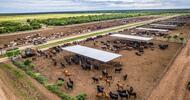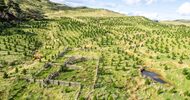On est au cœur de la nécessité d’une régulation publique, nationale comme internationale à travers les biens publics mondiaux. Sans elle, c’est évidemment l’intérêt financier et/ou l’intérêt étranger qui prévaudra.
Pergam: "J’ai débuté mes achats de terres en 2005, en les étalant sur une période de deux ans jusqu’en 2007. La majorité des terres acquises se situe en Uruguay (35 000 hectares dont 40 % sont consacrés à la culture et 60 % à l’élevage) et les autres, en Argentine, soit 10 000 hectares. J’ai effectué ses achats au travers de la société argentine Campos orientales, l’un des plus gros propriétaires terriens du pays. La plus value latente est de l’ordre de 30 % en deux ans."
Les investisseurs internationaux jettent leur dévolu sur les terres agricoles – les meilleures et les mieux irriguées. Elles constituent pourtant le moyen de subsistances des populations locales. Mais les gouvernements font peu de cas de celles-ci.
Alarmed by exporters’ trade restrictions, food importing countries have realised that their dependence on the agricultural market makes them vulnerable not only to a surge in prices but, more crucially, to an interruption in supplies.
- Financial Times
-
24 May 2009
African countries are giving away vast tracts of farmland to other countries and investors almost for free, according to a report published by IIED, IFAD and FAO
- Financial Times
-
24 May 2009
Export bans during last year's food crisis hurt global confidence in trade and helped push investors to buy up farmland in developing nations, an official from the United Nations' food agency said on Tuesday.
Neo-colonialists are buying up agricultural land in Africa – and local farmers could be crushed unless there are international rules to protect them.
- The Independent (UK)
-
03 May 2009
China has said it will not join the growing trend of outsourcing food production by investing in overseas farmland, particularly in Africa, expressing doubts that such deals could improve its food security.
- Financial Times
-
20 April 2009
Rich nations buying farmland in less developed countries to boost own food supplies should also contribute to improving agriculture overseas, heads of two United Nations' food agencies said.
La FAO s’apprête à sortir ces jours-ci un mode d’emploi sur la bonne gouvernance foncière. Histoire que le nouveau droit foncier de Madagascar ne soit pas défini par Daewoo Logistics. Et que les petits paysans du Sud participent enfin au débat
- Inter Press Service
-
01 Mar 2009
FAO believes that the time has come to give deep thought to creating the conditions to ensure the success of international ‘joint-ventures’ for food production
- WAM (Emirates News Agency)
-
12 February 2009
With vast tracts of land being sold in Madagascar, and Sudan and other African governments actively seeking investors in agricultural land, are we witnessing a neo-colonial land grab or will the investment result in greater food productivity to the long-term benefit of recipient nations?
- African Business
-
07 February 2009














